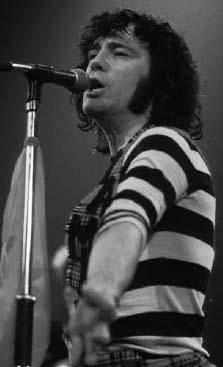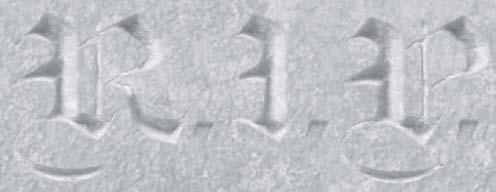The Encyclopedia of Dead Rock Stars (80 page)
Read The Encyclopedia of Dead Rock Stars Online
Authors: Jeremy Simmonds

Ernie Freeman
(US pop/rock ‘n’ roll pianist who hit as lead with B Bumble & The Stingers - also worked with Duane Eddy and Bobby Vee and backed Frank Sinatra; born Ohio 16/8/1922; heart attack, 15/5)
Lee Hays
(US folk singer/songwriter with The Weavers who co-wrote the standards ‘If I Had a Hammer’ and ‘Kisses Sweeter Than Wine’; born Little Rock, Arkansas, 14/3/1914; diabetic cardiovascular disease, 26/8)
Alan Malarowitz
(US drummer with Sweetwater; born
c
1950; falling asleep at the wheel, he crashed his car in the desert between LA and Las Vegas during the summer)
Dewey ‘Pigmeat’ Markham
(US R & B/comedy singer, whose career spanned six decades crowned by the UK/US 1968 Top Twenty hit ‘Here Comes the Judge’; born North Carolina, 18/4/1904; stroke, 13/12)
Hugo Montenegro
(US composer/orchestra leader who scored a UK #1/US #2 with ‘The Good, the Bad and the Ugly’ in 1968; born New York, 2/9/1925; emphysema, 6/2)
Tommy Moore
(UK drummer who toured Scotland in May 1960 with The Silver Beetles - ie, The Beatles - but left after a month because he despised John Lennon; born Liverpool,
c
1924; unknown)
Doug Roberts
(US drummer with The Fireballs, who made US #1 with ‘Sugar Shack’ in 1963; born 15/6/1941; unknown, 18/11)
Justin ‘Jud’ Strunk Jr
(US country/comedy singer/banjoplayer who hit with ‘Daisy-a-Day’ in 1973; born New York, 11/6/1936; piloting his own light aircraft, he crashed in a Maine forest, 15/10)
Sandra Tilley
(US Motown singer who saw stints with both The Velvelettes and Martha Reeves & The Vandellas; born Cleveland, Ohio, 6/5/1943; brain aneurysm, 9/9)
Joan Weber
(US singer who topped the chart in January 1955 with ‘Let Me Go, Lover’ only to return to obscurity, depression and mental illness; born New Jersey, 12/12/1986; unknown, 13/5)
1982
JANUARY
Friday 22
Tommy Tucker
(Robert Higginbotham - Springfield, Ohio, 5 March 1933)
(The Dusters)

Robert Higginbotham was an accomplished pianist before he had even mastered the longer words in his school reader. His family knew he was destined for success, but even
he
knew he’d have to lose the family name to get on. At school, he’d been named ‘Tommy Tucker’ after the pro-football great, and it stuck. His first live work was age sixteen with Bobby Wood’s jazz-tinged band – but when this act suddenly became a vocal concern in the wake of the doo-wop craze, the newly renamed ‘Tee’ Tucker set up his own trio, The Dusters, with Welton Young (guitar) and Brenda Lee Jones (bass). After sessions with the Atco label, Tucker realized he had a fairly decent singing voice, and it seemed just a matter of time before the hits came (Young and Jones had already had success under their own steam, as Dean & Jean). A move to Herb Abramson’s Atlantic finally placed Tucker high on the Billboard listings with the muchloved ‘Hi-Heel Sneakers’ (1964). The follow-up, Don Covay’s ‘Long Tall Shorty’ (1964), was a lesser hit, but, like its predecessor, is still played today. Abramson stuck by his protégé, but no more hits were forthcoming. An irrepressible performer, Tucker still made a decent living from the club circuit and package tours, while working as a real-estate agent by day.
His demise is apocryphal: putting a high gloss on the wooden floors of his apartment in East Orange, New Jersey, the musician inhaled carbon tetrachloride, and his system was immediately poisoned by the noxious fumes. He died shortly after at College Hospital, Newark. His publicity people were quick to suggest that the musician had died from food poisoning - possibly to avoid the inevitable ‘perfect finish’ headlines.
Golden Oldies #1
Lightnin’ Hopkins
(Sam Hopkins - Centerville, Texas, 15 March 1912)

The first of our overage entries is a man rightly regarded as one of the greatest blues guitarists of all time. Lightnin’ Hopkins was the real McCoy - a man who taught himself to play on a bizarre instrument fashioned from a cigar box and pieces of chicken wire at the age of eight. By the 1920s he was playing alongside Blind Lemon Jefferson, and the blues figurehead became a mentor during Hopkins’s formative years. His big break was accompanying pianist Wilson ‘Thunder’ Smith, which, naturally, led to his nickname. Acquiring vices like trading cards, Hopkins was known for his love of alcohol, nicotine, gambling, fighting and womanizing, and - like many black blues players - he found himself down on his luck. He was imprisoned during his early twenties and scarred for the rest of his life by the leg irons used to restrain him while inside.
Amassing almost a hundred albums to his name, Hopkins enjoyed a Top Five pop hit in 1950 (‘Shotgun Blues’), and later found a wide fanbase within the US psychedelic rock scene, opening for a slew of big names like Jefferson Airplane, Joan Baez and The Grateful Dead. Hopkins’s live performances were unfortunately curtailed by a serious car accident in 1970, but he remained an incredibly skilled guitarist with a gift for writing songs with little preparation, whose music, whether acoustic or electric, would gain new followers as rock ‘n’ roll progressed. Lightnin’ Sam Hopkins died on 31 January 1982 from cancer of the oesophagus; some 4,000 showed for his funeral in Harris County, Texas.

Alex Harvey: Rock ‘n’ roll’s own Dennis the Menace
‘Don’t make, buy or shoot any bullets. And when you get your freedom, don’t pish in the water supply.’
Alex Harvey gets oblique
FEBRUARY
Thursday 4
Alex Harvey
(Glasgow, 5 February 1935)
The Sensational Alex Harvey Band
(The Alex Harvey Big Soul Band)
(The Electric Cowboys)

It’s hard to imagine that a hard-drinking rock ‘n’ roll stalwart like Alex Harvey was once groomed for pin-up stardom in the wake of acts like Tommy Steele, but then many don’t realize that Harvey’s musical roots were in Dixieland jazz and skiffle, or that he fronted a soul band during the early sixties. The unlikely winner of a 1957 Scottish newspaper talent contest, Harvey dined out on his win for a couple of years, the solidly built singer and guitarist forming The Alex Harvey Big Soul Band, an act which supported US rock ‘n’ rollers Gene Vincent and Eddie Cochran when they visited Scotland in 1960 (shortly before Cochran’s death ( Pre-1965)).
Pre-1965)).
Harvey also landed a residency for his band in a Hamburg nightclub a couple of years after The Beatles. For the rest of the decade, he found irregular work as a session-player, and held down a succession of jobs, one of which is believed to have been as a lion-tamer. In 1972, Harvey’s life was changed by two separate events. In one of pop music’s most dramatic incidents, Harvey’s younger brother, Les – also a musician, with whom he had recorded – was electrocuted on stage in Swansea while playing with his band, Stone the Crows ( May 1972).
May 1972).
Just a few months later, promoter Bill Fehilly (then break-ing another popular Scot-rock band, Nazareth) put Harvey in contact with Tear Gas, a crumbling group – namely Zal Cleminson (guitar), cousins Hugh and Ted McKenna (keyboards and percussion) and Chris Glenn (bass) – and The Sensational Alex Harvey Band was formed. Here, finally, was an act to do some justice to a natural frontman – Cleminson, in particular, was a great foil to the hard man in the stripy shirt, with his Jokerstyle stage makeup and sequins. Over the next few years, SAHB, as they were mainly known, developed one of the most popular stage acts in the UK. They outgrossed (in every sense) most opposition, gigging almost constantly, putting out eight albums in five years and placing a series of hits in both album and singles charts. As a sort of shambling answer to Bowie’s live shtick, Harvey also had his own ‘alter ego’, a stage creation known as ‘Vambo’ who was also the subject of many of SAHB’s songs. The group’s hilarious 1975 deconstruction of ‘Delilah’ was an improvised stage piece before it placed at UK number seven – while the band were in the USA having their equipment stolen by the Mafia! There was more tragedy for Harvey, though, with the plane-crash death of his manager, Fehilly, just as another hit, ‘Boston Tea Party’, was climbing the charts (1976). Clearly suffering from the loss, Harvey collapsed on tour in Europe. For the next few months, his live performances became more and more erratic as he depended increasingly heavily on alcohol and drugs. Also suffering from acute back problems, Harvey announced his retirement from live work in 1977. To all intents and purposes, The Sensational Alex Harvey Band were wound up when Cleminson joined rivals Nazareth after the
SAHB Stories
album (1976).
